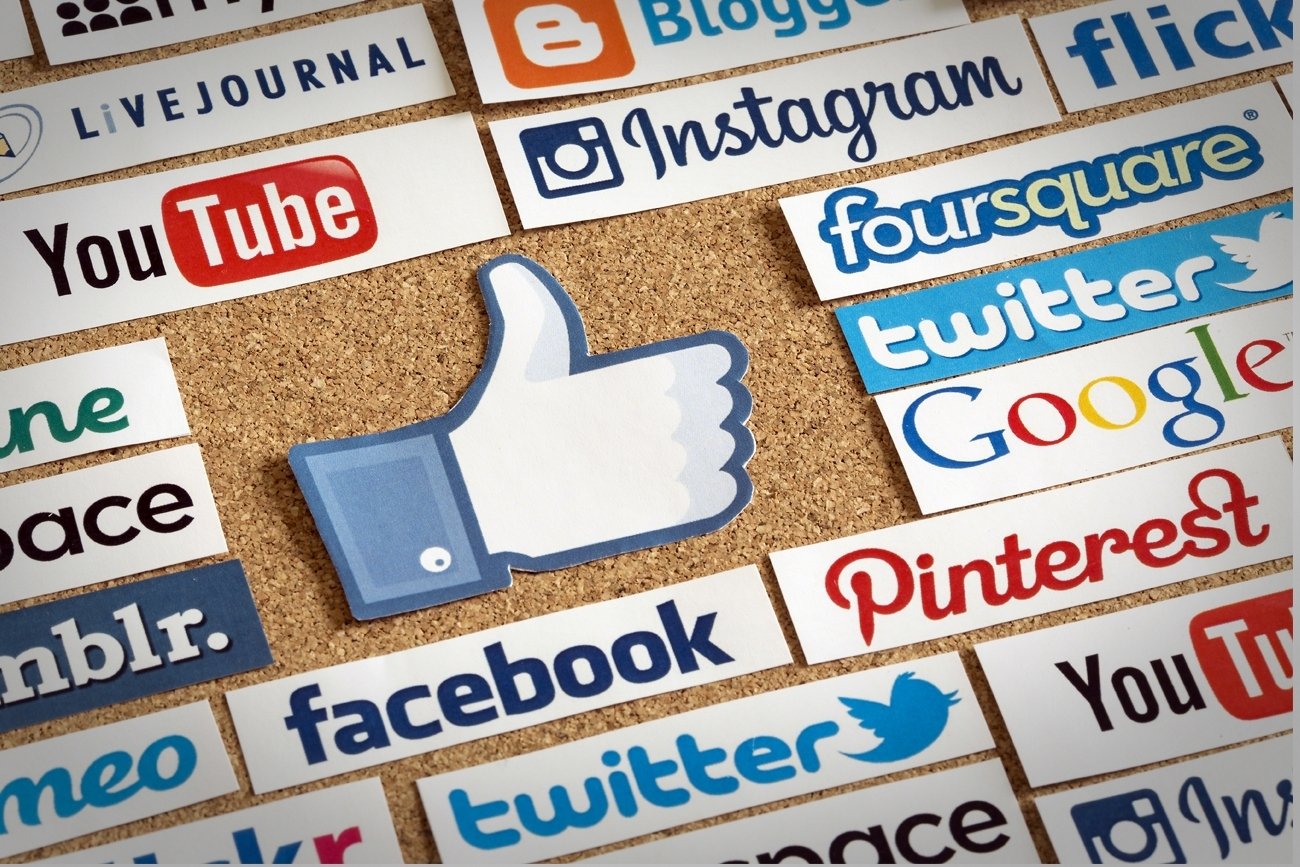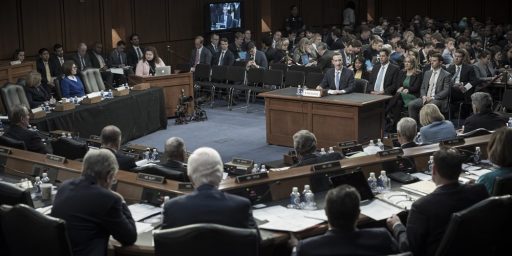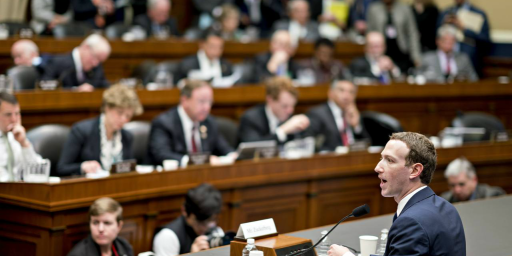No, Your Facebook Likes Didn’t Steal the Election
Will Bunch wildly exaggerates the Cambridge Analytica scandal.
The Philadelphia Inquirer‘s Will Bunch has a rather bizarre column seeking to explain “How your Facebook ‘likes’ helped Trump steal the 2016 election.”
Nixon on steroids, indeed. In 1972, the 37th president’s dirty tricksters got caught in the Watergate with some Radio Shack-style gizmos and some badly applied duct tape trying to bug the Democratic Party’s headquarters so they could try to steal the words of one man, party chief Larry O’Brien. That act — and the various cover-ups and sleazy maneuvers that surrounded it — cost Richard Nixon his presidency.
In 2016, Donald Trump’s presidential campaign paid roughly $6 million to a firm founded by a hedge-fund billionaire supporter that used 21st-century technology, subterfuge and out-and-out fraud to essentially steal the thoughts of 50 million Americans — quite possibly you, or your friends and neighbors — to launch a psy-ops campaign against voters, to put Trump in the White House. In other words, multiply Watergate to at least the 10th power.
Whoa if true.
In 2013-14, the young firm called Cambridge Analytica had backing from the right-wing billionaire, Robert Mercer; a rising political force in its association with the Breitbart News impresario Steve Bannon; a bold mission to, in the words of one former employee, “fight a culture war in America” and a scheme to use state-of-the-art Big Data and psychological profiling to win elections with modern propaganda.
What CA lacked, however, was the data the pull this off. That’s when what Facebook’s top lawyer has now acknowledged was “a scam — and a fraud” came into play. Wylie — the young political data maven now turned whistleblower — and the team assembled by Mercer and Bannon turned to experts in “psychometrics” at Britain’s Cambridge University; there, a Russian American (heh … a bit more on that later) professor named Aleksandr Kogan was hired for $800,000. Kogan reportedly then lied to Facebook about his real project — a personality quiz and an app that 270,000 people consented to but which allowed the firm to pull Facebook “likes” and other personal info from 50 million unsuspecting Americans. (The company also seems to have lied to Facebook about later destroying the data.)
According to the newspapers, Cambridge Analytica ultimately created about 30 million usable profiles for voters — who were then targeted in the 2016 election with the kind of psychological warfare that the Pentagon has honed for decades to use on our enemies.
In 2016, the enemy was us.
Indeed, Wylie noted that Cambridge Analytica emerged from a defense contractor called SCL and what it began to market in the mid-2000s was “cyber warfare for elections.” The Mercer-and-Bannon-backed CA was initially hired to work for GOP Sen. Ted Cruz in 2016 — Mercer’s initial horse in the race — but the team had switched by summer 2016 to party nominee Trump, which then paid the firm about $6 million.
So . . . they gave a personality quiz on Facebook so they could mine user Likes? That’s sleazy, to be sure, but not exactly Watergate. And these military-grade psychological warfare techniques were first applied to Ted Cruz, who eeked out a narrow win in the Iowa caucuses and then didn’t win another significant race other than his home state of Texas?
What does political cyber warfare look like? As you might imagine, pretty ugly. In an election where most voters’ preferences are deeply rooted, a campaign like the one engineered by Cambridge Analytica tried to tap into the psychology of the voters who could most easily be peeled away from Trump’s opponent Hillary Clinton — young people who might be convinced to vote third-party, or blacks who’d been enthusiastic about Barack Obama but could be discouraged from showing up in 2016. Data seemingly as trivial as what sneakers or candy bars you like helped develop profiles of the persuadable.
So-called dark posts reminded African American voters about Clinton’s infamous 1990s comment about young blacks whom she labeled “super-predators,” while in specific neighborhoods like Miami’s Little Haiti there were messages linking the Clinton Foundation to post-earthquake problems in Haiti. It’s impossible to know how well these “dark posts” worked but the objectives were certainly achieved. A recent major study by a team of political scientists found that a whopping four million 2012 Obama voters, many of them nonwhites, sat out 2012 and many others voted for third-party candidates like Jill Stein of the Green Party, which is what Team Trump and their hired guns at CA wanted them to do. At Trump’s post-election rally in Hershey in December 2016, the then-president-elect bluntly noted that blacks “didn’t come out…So thank you to the African American community.”
So, these bastards use their super-secret data-mining to discover that blacks were less enamored of Hillary Clinton than they were of Barack Obama? And that they didn’t enjoy being called “super-predators”? Because, sneakers?
But at the end of the day, a capitalist company such as Facebook and its billionaire founder Zuckerberg have gotten rich by exploiting the essence of our humanity — our friendships and even our personalities — for profit. The Trump-Cambridge Analytica scandal is a two-lane highway to hell — your intimate personal data flowing north to shady operators, then flowing back south as divisive negative politics or even “fake news.” That’s an existential threat not just to democracy but to a broader civil society.
That some significant number of people are getting most of their information from algorithm-chosen sources designed to keep their attention as long as possible is problematic. That it might be further manipulated for nefarious purposes compounds the issue. But we were dividing up in this manner even before Facebook, let alone Cambridge Analytica.
Bunch’s column concludes with a long rant about possible collusion with the Russians and the general problem of Russian attempts to manipulate the election outcome. Those are indeed major threats to our democracy. We should continue to investigate those and Congress should ensure that President Trump does not interfere in said investigation.
It’s possible that the data-mining scandal will be an existential threat . . . to Facebook or its senior leadership. As of yet, however, there’s zero evidence that the 2016 election was “stolen,” let alone by Cambridge Analytica, Facebook, or Trump.







IDK
It’s no more bizarre than any other hyperventilating #MuhRussia Trump collusion story.
@TM01: I mean, sure, aside from the fact that pretty much every US intelligence agency found Russia interfered in the election, the dozens of people charged with crimes in the matter, Trump going on TV and calling for the Russians to hack Hillary’s accounts, and the fact that damned near every member of the campaign team and Trump family seem to have deep ties with Russia and lie about them constantly, there’s really no reason we should pay attention to that story. At all.
@James Joyner: Sarcasm doesn’t translate when the cultural chasm is too wide…
And there isn’t likely to ever be any. I mean, advertisers track sales and do market research, but still are mostly guessing about whether their advertising is successful. So determining whether CA’s efforts were successful will be impossible. On the other hand, if votes are the equivalent of sales, we do have President Dennison.
I think you vastly mis-underestimate the power of Facebook over some peoples lives. I’m sad to say I know people who seem to live for that dopamine fix Facebook provides. Given that, with the narrow margin that Dennison won by, and it’s very plausible that this propaganda effort was not only effective but decisive.
The bigger question is, how do we combat this? Because it is not healthy for the Republic.
James, I think your framing is as bad as Bunch’s.
In other words, at least as I understand it, it wasn’t that they pulled “likes” but that they pulled enough data -without consent – to micro-target 30 million voters with precision. They flooded those voters with targeted “news” – most of which was wildly inaccurate- aimed specifically at those voters.
As one example, voters with a heightened fear/sensitivity about ISIS got a series of “articles” and posts stating that Hillary Clinton had sold/traded/given arms to ISIS. Because it was micro-targeted, there was no real push back because it wasn’t a media story.
I normally think the EU goes way too far with data protection, especially with GDPR about to go live, and the “right to be forgotten” but when you see what can be done with the information, maybe they have a point…
@SKI: Okay. But this gave CA no more information about users than Facebook and its other advertisers have. Or Google and its advertisers. Or the failed Cruz campaign had.
@James Joyner: I don’t believe that is accurate.
My understanding is that they got info that would only be available with consent – which they didn’t have from almost all of the targets.
They downloaded publicly available data. It’s akin to people screeching about the police reading their public twitter postings. I mean…..maybe don’t put your information on a website where anyone can read it if you really don’t want people reading it.
@jpe788:
Nope.
Given the above, it certainly wasn’t “publicly available”.
I’m unhappy about the algorithmic feed of Facebook and Google+ in general (does Twitter do it?), because it leads to fragmentation of the electorate, and isolation of one group from another.
It also allows for a greatly amplified “whisper network”. It’s like email chains on steroids. With the right data, one can find the sort of people who might accept and even amplify crazy rumors such as Pizzagate.
I find this a problem, even though the hype is definitely a bit breathless.
Also, I believe SKI’s analysis to be correct. They far exceeded their mandate with Facebook, though no US laws were broken.
The Clinton campaign probably had a similar big data, micro-targeting operation. I believe the Koch Bros have set up a similar operation shadowing whatever the Republican Party has. So far CA’s dirty trick is “stealing” their data from Facebook. Facebook fails to protect data, and CA has probably already set up a sub under a new name to continue to vacuum up anything they can. Bunch doesn’t like that campaigns do this. I don’t either. But you didn’t quote Bunch saying anything objectionable about it. Per @SKI: some of this (selling data, perhaps not sneaking in and hoovering it up) is illegal in the UK. Perhaps it should be here. Perhaps it’s appropriate for Bunch to discuss the issue.
The “long rant” about Russian collusion is a matter of pointing out two obvious red flags about possible Russian connections. The idea that CA may have shared data with Russian actors has been rumored for at least a year. If proven, it would be a huge smoking gun, clearly cause for impeachment if Trump can be shown to have known about it.
@gVOR08: Not exactly. They sucked it up in 2014. The actual security protections changed in 2015.
They also sent a cease and desist and destroy notices in 2015. CA apparently lied and claimed they destroyed the data without disclosing (even in testimony before Parliament recently) that they had migrated the data into another form and had only destroyed the original set but not the fruits of that tree.
And no, neither Clinton nor Obama went down this same path. It could only happen because the original data was being collected for academic research purposes and was, even at the time it was collected, not allowed to be used for commercial or non-academic purposes. For campaign purposes, they can only access and use information that they are given permission for by the individual themselves. What CA did was access, download and use information of the friends of the people who had given consent.
This Mr. Wylie – the man who has pink hair. And he expects to be taken seriously?
@Tyrell:
The color of his hair has zero bearing on the information he disclosed.
@de stijl: Really? Okay. I listened to his interview on one of the networks as long as I could as he stammered, repeated, jumbled, and stumbled; not giving one coherent thought. And we are supposed take this serious?
Facebook has done this stuff for years.